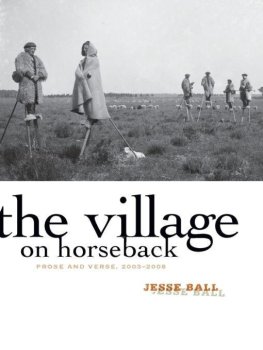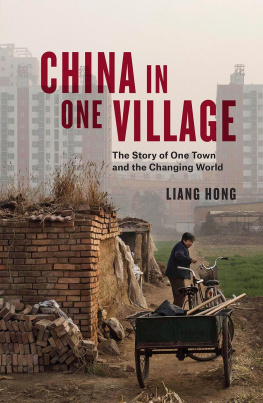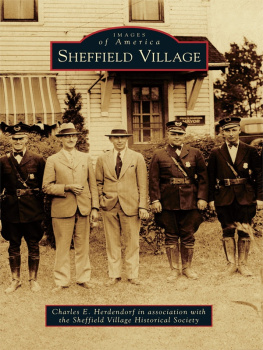Isabel Crook - Revolution in a Chinese Village - Ten Mile Inn
Here you can read online Isabel Crook - Revolution in a Chinese Village - Ten Mile Inn full text of the book (entire story) in english for free. Download pdf and epub, get meaning, cover and reviews about this ebook. year: 1959, genre: History. Description of the work, (preface) as well as reviews are available. Best literature library LitArk.com created for fans of good reading and offers a wide selection of genres:
Romance novel
Science fiction
Adventure
Detective
Science
History
Home and family
Prose
Art
Politics
Computer
Non-fiction
Religion
Business
Children
Humor
Choose a favorite category and find really read worthwhile books. Enjoy immersion in the world of imagination, feel the emotions of the characters or learn something new for yourself, make an fascinating discovery.

- Book:Revolution in a Chinese Village - Ten Mile Inn
- Author:
- Genre:
- Year:1959
- Rating:3 / 5
- Favourites:Add to favourites
- Your mark:
- 60
- 1
- 2
- 3
- 4
- 5
Revolution in a Chinese Village - Ten Mile Inn: summary, description and annotation
We offer to read an annotation, description, summary or preface (depends on what the author of the book "Revolution in a Chinese Village - Ten Mile Inn" wrote himself). If you haven't found the necessary information about the book — write in the comments, we will try to find it.
Revolution in a Chinese Village - Ten Mile Inn — read online for free the complete book (whole text) full work
Below is the text of the book, divided by pages. System saving the place of the last page read, allows you to conveniently read the book "Revolution in a Chinese Village - Ten Mile Inn" online for free, without having to search again every time where you left off. Put a bookmark, and you can go to the page where you finished reading at any time.
Font size:
Interval:
Bookmark:
This book shows how one backward village became a revolutionary bastion
the revolutionary forces must build the backward villages into advanced, consolidated base areas, into great military, political, economic and cultural revolutionary bastions
Mao Tse-tung
In the middle of the civil war between the Chinese Communists and the Kuomintang, the writers floated on a barge down the Grand Canal, through no-mans-land and into the Liberated Areas. At the end of November 1947, they finally reached the cluster of villages in the foothills of the Taihang Mountains which formed the capital of the Shansi-Hopeh-Shantung-Honan Border Region.
There they were asked to submit a written plan of what they were interested in doing in the Liberated Areas. The plan submitted consisted of an outline for a detailed study of land reform in one village.
Meanwhile, the writers were invited to stay at the Border Region Government Guest House in the village of Ten Mile Inn. This in itself was closer to the realization of their aims than it may sound, for the Guest House consisted of a number of rooms scattered in different villagers homes. The writers slept in one home, ate in another, and visited fellow visitors and members of the staff in still others. This, together with having a free run of the village, permitted a fair amount of informal observation. In a short time the writers were granted permission to go a step farther and to carry on a preliminary investigation of the village while waiting for the official decision on the plan which they had submitted.
The village government cadres were told that the writers were foreign friends who had come to learn about the Liberated Areas; so were the Communist Party members. Consequently we were treated in a friendly fashion by the great majority of the villagers, who never begrudged the time to answer our questions or to bombard us with their own.
Besides the villagers themselves, the personnel of the Border Region Government offices, which were located in the village such as the Public Relations Department, the Reception Centre for students fleeing from the Kuomintang areas, the South Hopeh Bank were extremely helpful.
This period of gathering background information included a careful study of the daily newspaper, especially of the reports of the Border Region Agrarian Conference which was then in session. When the Conference was over, Yang Hsiu-feng, Chairman of the Border Region, found time to discuss the writers plan with them. It was then mutually agreed that it would be most valuable to study the operations of one of the work teams which were to be organized in accordance with the Conference decisions. These work teams were to guide the peasants throughout the whole Border Region in putting the Agrarian Law into effect and reorganizing and purifying the ranks of the Party. Chairman Yang explained to the writers that the Border Region Central Bureau of the Chinese Communist Party was going to organize a special team which would take the lead in setting the campaign in motion. This special team was to operate in the vicinity, and Ten Mile Inn was to be its second break-through point. This at once gave our background material possibilities of proving of direct value. We asked and were given permission to make Ten Mile Inn itself the object of our detailed study.
There were still six weeks till the work team was due in the village. During this time the writers not only had a chance to gain further useful background knowledge, but the villagers had a chance to become familiar with the writers. In time, instead of being regarded as something distinctly unusual, the writers presence was taken for granted and did not distract attention from the matters on hand.
The collection of the material was the work of a team, the size and composition of which varied at different periods. Miss Chu Chung-chih, Mr. Yang Piau and Mr. Li Huan-shan all took part at one time or another. The one permanent member of the group, besides the writers, and the one who carried the heaviest burden of work, was Mr. Li Ti-hua. Mr. Yang Fang-hsiung, of the South Hopeh Bank, whose job included studying the results of rural banking policy in the village, also provided much useful information.
The most essential part of the material was collected during the Campaign for the Adjustment of Land Holdings and the Purification and Reorganization of the Party. This Campaign lasted from February 26th to April 15th, 1948. During this time, as at all others, the writers were given every facility for observing and investigating what was going on. The only limitation imposed was that of their own ability to understand what they saw and heard. They were, however, given every opportunity to overcome this limitation in individual talks with the rank-and-file members of the work team as well as with its leaders, up to and including Chang Pan-shih of the Central Bureau. They were also permitted to attend meetings of all sorts of the villagers themselves and of the work team; and to examine a mass of written material village documents, statistical records, instructions to the work team, etc.
Besides this, the group members observed what was going on in the ordinary course of village life. They attended village meetings on aid to soldiers families, on winter production, production loans, etc.
Since all the investigators lived in various villagers homes, they had an opportunity to get to know several families quite intimately. The rooms occupied by the Border Region Reception Centre and Guest House were allocated by the peasant union. They had formerly belonged to landlords, rich peasants and others who, rightly or wrongly, had been struggled against by the people and had had their houses partially or totally confiscated. However, in most cases the former owners still occupied part of the house. These struggle objects constituted the very section of the population whom it would normally have been most difficult to approach; but close daily contact with them gave us as clear a picture of the life of the disenfranchised as we were able to obtain of the other more confident and communicative peasants.
The frequently used quotations are not based on inference or deduction; they are statements actually heard by the investigators or reports made by the villagers of things they actually heard. The statements and reports have been edited and freely translated, but they have in no case been invented.
There has been no attempt, in the interests of artistic presentation, to reduce the number of characters by making composite types. All the characters are real persons.
The list of people to whom the writers wish to extend their thanks, without in any way implicating them in the books short-comings, is long. First and foremost, of course, are the Chinese members of the investigation team who bore the brunt of the work of collecting the material on which the book is based.
We are particularly indebted, too, to Professor Raymond Firth of the London School of Economics for his constant help and encouragement.
Several students of the Foreign Languages Institute helped with the translation of various documents and reports.
It goes without saying that the book could not have been written without the facilities accorded by Chairman Yang Hsiu-feng and other officials of the Shansi-Hopeh-Shantung-Honan Border Region.
Finally, we would like to acknowledge our indebtedness to the Scarborough Fellowship Fund for its generous support.
I. and D. C.
Peking, 1958
Ten Mile Inn is situated in the foothills of the Taihang Mountains at the meeting-place of the four provinces Shansi, Hopeh, Shantung and Honan. This meeting-place was the centre of the Shansi-Hopeh-Shantung-Honan Border Region, which in the latter half of 1947 covered an area of about eight hundred thousand square miles in the four provinces. Its seventeen million acres of cultivated land supported a population of thirty million people.
Font size:
Interval:
Bookmark:
Similar books «Revolution in a Chinese Village - Ten Mile Inn»
Look at similar books to Revolution in a Chinese Village - Ten Mile Inn. We have selected literature similar in name and meaning in the hope of providing readers with more options to find new, interesting, not yet read works.
Discussion, reviews of the book Revolution in a Chinese Village - Ten Mile Inn and just readers' own opinions. Leave your comments, write what you think about the work, its meaning or the main characters. Specify what exactly you liked and what you didn't like, and why you think so.




